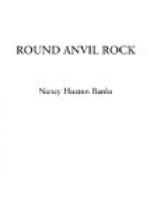Philip Alston went to her side with his deferential air, and told her that he could not stay for the evening meal. He explained that he was expecting several friends that night over the Wilderness Road. It was possible that they might already have arrived and were now awaiting him in his cabin. He must hasten homeward as fast as possible. So saying he took her bony little hand and bowed over it, and made another bow of precisely the same ceremony over the widow Broadnax’s pudgy fingers. He always brought his finest tact to bear upon his acquaintance with these ladies.
He looked around for Ruth and held out his hand. She came to him, and went with him to the door. They stood close together for a moment, talking with one another while the others were settling around the table. When he had mounted his horse and set out, she still stood gazing after him till the judge’s voice, exclaiming, caused her to turn.
“Call Alston back, if he isn’t out of hearing!” he said.
Ruth shook her head. Philip Alston always rode very fast. He was already out of sight in the falling night.
“Pshaw! I never seem able to keep my mind on anything these days,” the judge said, fretted with himself. “I fully meant to ask Alston to take that money to the salt-works. It wouldn’t have been much out of his way. I don’t know what makes me so forgetful lately—and always so drowsy. I promised faithfully to pay for that cargo of salt to-day, so that it would be on the river bank ready for loading when the flatboat comes to-morrow. The owner of the boat sent the money yesterday. I’ve got it here in my pocket. And the salt was to be delivered for cash; it will not be sent till it is paid for.” He paused a moment in troubled thought. “David! Call that boy. He’s always hidden off somewhere.”
“Here, sir,” said David, standing up and coming out of the shadow beneath the stairs.
“You will have to help me in this matter, my lad,” said the judge, kindly, forgetting his momentary irritation. “I’ll have to send the money by you.”
He drew from his pocket a queer-looking roll which he called his wallet. It was a strip of thin, fine deerskin, bound with a narrow black riband and tied with a leathern string. The bank-notes were rolled in this, and the gold pieces and the “bits”—which were small wedges of coin cut from silver dollars—were in two pouches sewed across the end of the strip. It was very seldom that this wallet of the judge’s contained so large a sum of money as on that night, for salt was dear in the wilderness. It required eight hundred gallons of the weak salt water and many cords of fire-wood, and the work of many men for many days, to make a single bushel of the precious article. It was still scarce and hard to get thereabouts at five dollars a bushel, so that a large sum was needed to pay for an entire cargo. Drops of perspiration stood on the judge’s forehead as he counted




